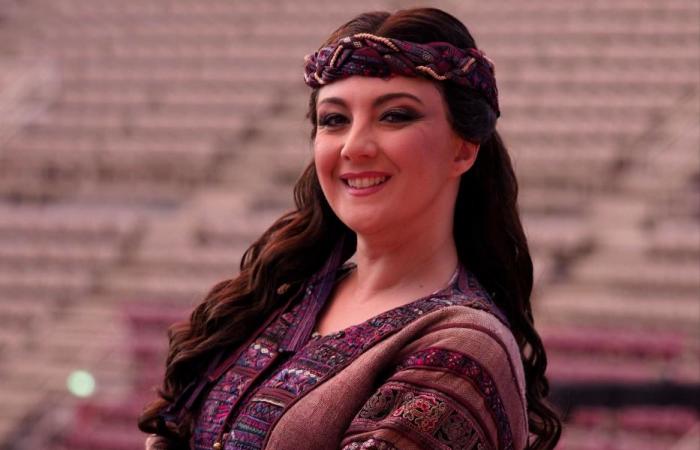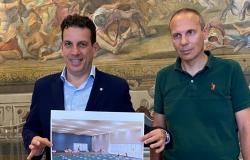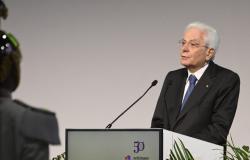She started singing Mina. « In the oratory, at the village festivals that take place in my Calabria ». Piano bars and festivals between Words, words, If calling e Big big big. « I have always been fascinated by Mina’s ability to create a character in the three minutes that one of her songs lasts…». Today she is a Puccini star. « My debut was in Paris with her Bohemia “. It was Magda in the Swallow conducted by Riccardo Chailly in April at the Teatro alla Scala. Then Liù in Turandot which opened the 101st season of the Verona Arena at the beginning of June – a season inaugurated by a TV-sized concert/show where he sang Oh my dear daddy dal Gianni Schicchi to celebrate the UNESCO seal on Italian opera singing as an intangible heritage of humanity. And she gave voice to Mimì, the unfortunate protagonist of the Bohemia, in last Friday’s concert in Lucca conducted by Riccardo Muti and broadcast worldwide, the heart of the celebrations for the centenary of the Tuscan composer’s death. « Unique in creating female characters so complex and profound, so true. Characters that I love to interpret… like those in Mina’s songs». Mariangela Sicilia has a Puccini agenda for the whole of 2024. « At the end of the month she will still be Mimì in the Bohemia at the Macerata Opera Festival» says the soprano, originally from Marzi, nine hundred souls in the province of Cosenza. Riccardo Muti, Antonio Pappano, Michele Mariotti are the conductors who conducted her. Graham Vick, who with her created the Boheme at the Comunale in Bologna, Robert Carsen, Damiano Michieletto are the directors with whom he has worked. La Scala and the Bolshoi, Berlin and Beijing, Naples, Florence and Turin are the theaters he frequents. «And between one rehearsal and another I run to Rome for the archaeological excavations at the Palatine».
Archaeological excavations, Mariangela Sicilia?
«Yes. I was always good at school. I liked art, but also math, science and chemistry. Even though I knew for sure that music would be my life, I thought about enrolling in a restoration course. Also to indulge my mother who always said: It’s fine to sing, but you also need a parachute… So taking advantage of the forced stop that Covid imposed on us artists, I enrolled in the master’s degree course in Archaeology at La Sapienza University in Rome. A discipline that scientifically analyzes art. My passions. I excavated in Crete and on the Palatine, in Professor Paolo Carafa’s team. A beautiful passion. Because music takes up 90% of my life».
And when was your passion for singing born?
«Very early. I would say it is innate. There are videos of me at nursery school plays, at three years old, singing at the top of my lungs. There are no musicians in the family, only my grandfather played the mandolin. Growing up I discovered Mina and I became passionate about her voice, her way of interpreting, of being a character in each of her songs. I sang in the squares, at parties and so someone suggested to my mother that I study».
Pop studies?
«Not exactly. First private lessons, then I enrolled at the Giacomantonio Conservatory in Cosenza. I studied piano for five years, also taking choral singing lessons. At 15 I decided to move on to studying singing. And I graduated. But I was also fascinated by acting, by interpreting, by putting myself in someone else’s shoes. So much so that I even thought about attending an acting academy. For a while I was also part of an amateur prose company. Then music absorbed me completely… but being an opera singer I can vent this passion of mine on stage». When did you realize that music would become your profession?
“I’ve always felt it, I’ve always thought it, it couldn’t be otherwise. I’ve never thought of music as a hobby. Because I live this profession of mine more than as a passion that has become a job, as a vocation. The turning point was definitely in 2014 when I won Placido Domingo’s Operalia competition. That year’s edition was held in Los Angeles and I was the only Italian in the competition.”
The debut with Puccini was immediate and Bohemia in Paris. She feels like an interpreter pucciniana?
“I approached opera because I like to interpret. And Puccini is the antechamber of cinema. In his writing there is no division between recitatives and arias, but the story is all one, a music of conversation, a continuous flow like in a film that moves from beginning to end. For me, getting into it is very intuitive, I feel it is very close to my way of expressing myself.”
And what other authors does he like?
«Mozart, for the same reason as Puccini. It is interesting to see how over the centuries recitar cantando has evolved, balancing the weight between music and words ever better. The twentieth century is exemplary, but Mozart was a pioneer, let’s think of the perfection of the theater in Da Ponte’s trilogy with Don Giovanni, Marriage of Figaro e As fan all».
Traditional direction or modern direction?
“I would say intelligent direction, which offers me valid reasons for interpretation to understand the modernity of an opera. For me, opera also carries a social message, it is not only formal beauty, which should also be savored. Therefore, direction that speaks to our time.”
Do you listen to singers from the past? Who inspires you?
“I love all the lyric sopranos, Anna Moffo, Mirella Freni, Katia Ricciarelli, Daniela Dessì. I listen to them and try to get something from each of them.”
What music would you like to sing the most?
«The French one, I find it suitable for my vocality, a mix of fireworks and dramatic exploration of the characters. I think of Faust o Romeo and Juliet in Gounod Thais by Massenet”.
Many careers today last a handful of years, how not to burn out right away?
“Saying a lot of no. A career is built on nos rather than on a collection of roles. The temptation to say yes to characters you dream of playing is there, there’s no point in denying it, but you have to say yes at the right time, when your vocal and interpretative maturation is at the right level to also have good credibility on stage.”
Who should he thank?
“To many, starting with my family. But perhaps especially to those who judged me negatively. Because you grow not by rejoicing in hearing how good you are, but by working on the things you need to improve.”
For Latest Updates Follow us on Google News






